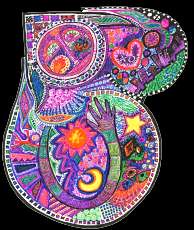On Wednesday, January 16th at 22:00 GMT (check your local time) I’m throwing in a contribution into the online portion of the Future of Learning in a Networked World 2008 gathering. Why don’t you join us?
We have a FLNW Slide Sets space on Slideshare and I just uploaded the images I plan to use for this totally off-the-cuff experiment of drawing together online. Here is what I wrote as a teaser:
This is not a talk by any stretch of the imagination. It is an invitation to draw together to exercise our visual thinking. I have been doing F2F graphic facilitation work and it taps into something that I often feel missing online. So can we talk together, draw together then share our images to add to that conversation? What might happen? Let’s play.
See http://flnw.wikispaces.com/flnw2_itinerary for the full FLNW 2008 schedule, both online and on the ground in Thailand. Here is the Elluminate URL we’ll be using for the actual session. (Thanks, Leigh!) And here are the images…

 In one of my communities,
In one of my communities, 